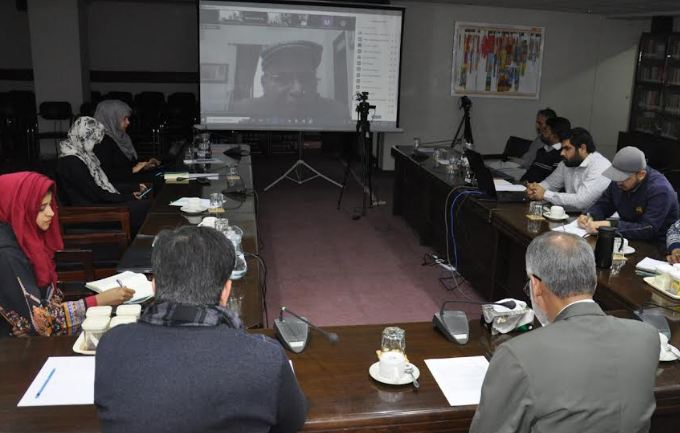Pakistan urged to aggressively counter India’s attempts to modify Indus Waters Treaty

ISLAMABAD, FEB 15 /DNA/ – India’s attempts to amend the Indus Waters Treaty will fall flat since the modification that India claims is already present in the treaty’s Article IX. To counter India’s propositions, Pakistan needs to retaliate with a pragmatic response and a legal stance with a strong projection of its standpoint.
This was noted by speakers during a roundtable titled “Indus Water Treaty Arbitration – Battle over Water Sharing”, held at the Institute of Policy Studies (IPS). The session was addressed as keynote speaker by Mirza Hamid Hassan, former federal secretary, Ministry of Water and Power, while Khalid Rahman, chairman IPS, Ashfaq Mahmood, former federal secretary, Ministry of Water and Power, Syed Abu Ahmad Akif, former federal secretary and senior research fellow, IPS, Dr Fiaz Hussain Shah, associate professor, Centre for International Peace & Stability (CIPS) at National University of Science & Technology (NUST), Dr Bashir Lakhani, water expert and Ameena Sohail, legal expert also joined the discussion.
Highlighting India’s push for bilateral negotiations to modify the Indus Waters Treaty (IWT), Mirza Hamid said India is already designing its water projects with storages of a higher level and obstructing river flows more than what was permitted under the Treaty. Moreover, India upholds the neutral expert’s decision on using silt clearance technology in Baglihar Dam and ignores the subsequent decision of the International Court of Arbitration in 2013 which refuted the use of silt technology for more water storage and upturned the neutral expert’s decision as far as live storage is concerned. Hence, India is violating the IWT as well as other water-sharing international laws, he stated.
He condemned what he claimed were India’s blatant attempts to gain control over the three western rivers allocated to Pakistan in violation of the IWT. Moreover, as the western rivers’ waters are Pakistan’s lifeline and it is a matter of its survival, it is high time for Pakistan to take the initiative in raising the issue and projecting its stance to protect its basic rights, to resist India’s attempts to gain control over them, and safeguard its vital interests as a lower riparian state with an agricultural economy.
Putting forward his recommendations, he stressed that a very calculated response and a comprehensive action plan on the part of the government is required, coupled with the capacity building of relevant institutions like office of Pakistan Commissioner for Indus Waters (PCIW), Ministry of Water Resources, and Ministry of Climate Change; establishment of data cells and faculties for research programs in technical institutions; close liaison of academia and relevant government institutions; and proactive and firm projection of Pakistan’s stance in local and foreign media. Moreover, Pakistan must be ready to take the matter to the UN if India continues to boycott the proceedings of the International Court of Arbitration.
Ashfaq Mahmood underscored that India’s attempt to make amendments to the IWT would not be fruitful as the modification which India is claiming is already present in Article IX of the IWT on the “settlement of differences and disputes”, which mentions the ways and means to resolve issues. Moreover, it has been in practice under mutual terms of both states and India cannot modify, amend, or rescind the IWT unilaterally.
Despite the violation and non-compliance, India keeps projecting its stance aggressively while Pakistan has been a passive player in a defensive mode. This passive role, along with a weak projection of Pakistan’s case, has provided India enough margin to plan more than 150 projects like Baglihar and Kishanganga dams in violation of the IWT.
Adding to this, Ameena Sohail highlighted the shortage of information and scholarly intelligence on Pakistan’s point of view on this issue. For this, she stressed the need for an in-depth study of IWT for a stronger projection and enhanced capability to interpret its provisions to present argumentative assertions, develop academic content, and convince the international community of Pakistan’s stance.
While concluding the session, Khalid Rahman said it is critical that despite Pakistan’s case being true and proactive, its projection is still in a passive and defensive mode. While institutional incapacities and professional inadequacies are the underlying causes, it is all related to a vicious cycle of poor governance in Pakistan. To tackle this issue, Pakistan requires comprehensive preparations for developing an action plan, projecting its narrative, and retaliating with a pragmatic and reasoned response that encompasses all dimensions of the water dispute, he said.
Related News

Romanian Embassy concludes cultural days with Christmas concert
Ambassador of Romania to Pakistan, Dan Stoenescu, warmly welcomed the guests and highlighted the importanceRead More

Pakistan issues demarche to Taliban regime after Afghan soil used to martyr soldiers
ISLAMABAD, DEC 19: The Foreign Office (FO) on Friday issued a demarche to the AfghanRead More


Comments are Closed